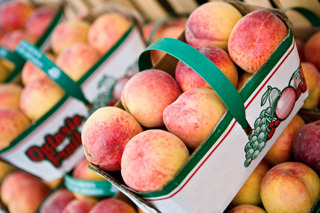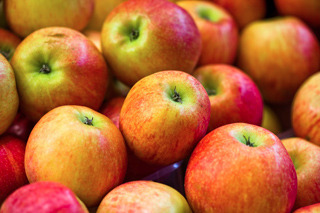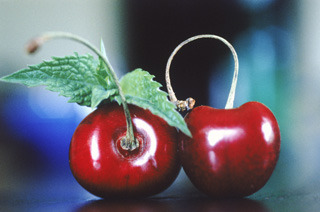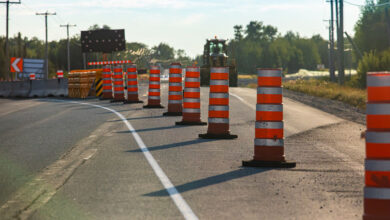Tree fruit production hard hit by spring’s cold
by Kristina Gabalski
 Uncharacteristic warmth in March followed by hard freezes have had a big impact on area fruit crops for growers, orchard workers and consumers. Local produce will still be available but quantities of some varieties of fruit could be significantly reduced. Photographic art from Thinkstock.This summer may not be as sweet as usual thanks to spring weather that featured an extended warm-up in March followed by devastating hard freezes which have decimated local tree fruit crops.
Uncharacteristic warmth in March followed by hard freezes have had a big impact on area fruit crops for growers, orchard workers and consumers. Local produce will still be available but quantities of some varieties of fruit could be significantly reduced. Photographic art from Thinkstock.This summer may not be as sweet as usual thanks to spring weather that featured an extended warm-up in March followed by devastating hard freezes which have decimated local tree fruit crops.
“This is a very difficult year for tree fruits for the immediate Rochester region – one of the worst since 1945 based on historical reports and preliminary loss estimates by growers and advisors,” says Bob King, Ph.D., Senior Agriculture Specialist at the Agriculture and Life Sciences Institute at Monroe Community College.
“Based on grower reports of individual tree blocks, yield losses on apples, cherries, peaches and apricots range from 50-100 percent,” King continues. “Blocks around the lake have experienced less damage than those farther inland.”
Several local farms are indicating they only expect a 50 percent total crop harvest for their overall operation, he explains, but cautions, “the only way to really know will be when growers harvest in the fall.”
Concrete data on losses will not be evident until mid-June, he says, following the June drop, when official documentation is taken by insurance adjusters and field advisors. “Not all fruit farms carry insurance for various reasons,” King notes. “At this point, preliminary reports are considered to be anecdotal since they are based on grower and advisor observations which tend to be very individual.”
 Consumers may have to look around for a favorite locally grown apple variety this season — some geographic areas were hit by hard frosts in March but orchards in other areas were unharmed. Thinkstock graphic.Crop estimates of apples and peaches in regards to quantity are very spotty throughout Western New York and the Finger Lakes regions, King says. “Several local growers have indicated they expect some varieties of apples and peaches will not be available.”
Consumers may have to look around for a favorite locally grown apple variety this season — some geographic areas were hit by hard frosts in March but orchards in other areas were unharmed. Thinkstock graphic.Crop estimates of apples and peaches in regards to quantity are very spotty throughout Western New York and the Finger Lakes regions, King says. “Several local growers have indicated they expect some varieties of apples and peaches will not be available.”
“Strawberries, brambles, and blueberries have been impacted,” he continues. “The king berry on strawberries on some early varieties has reportedly been damaged, while the second and third blossom is OK.”
Bob Brown at Brown’s Berry Patch in Waterport says the first “king” blooms were lost on his strawberries, but there will be a berry crop. “We irrigated to keep them from freezing,” he says.
At this point, Brown says, he’s not sure how the apple crop will look. “Some varieties, like Crispins, there will be none,” he says, because of their sensitivity to the cold.
There will be Romes, Galas and some Macs, Brown says, but he will not really know the extent of the damage until after the June drop, which is a natural drop of some fruit in June.
Despite the losses, “We will have apples, blueberries and strawberries,” Brown reassures. Sweet cherries, however, were hard hit. He calls cherries a “big loss,” but expects to have some peaches.
He also says most fruit crops will ripen at their regular time. With cooler temperatures in April, “we’re almost back to normal,” Brown says.
Lake Ontario didn’t always provide its usual protection this year, Brown notes. “Some growers near the lake weren’t any better off,” he says. “It’s unusual to have the jet streams go as far north as they have for as long as they have.”
“Weather moves in cycles,” he observes. “We had a horribly wet spring last year, you never know. We’re counting our blessings for what we have.”
Margie Robb at Robb Farm on Gallup Road says at least four varieties of apples have made it through the yo-yo weather. “We have Galas, Yellow Delicious, Jonamacs and Romes – those are for sure,” she says.
On the other hand, Robb says there are no Macs, Cortlands or Ida Reds and 20 Ouncers are uncertain.
Robb also worries about people who depend on the local fruit crop for their employment, people like truck drivers who transport the crop.
Bob King at MCC shares her concern.
“Besides growers, many input suppliers such as fertilizer dealers, packaging companies and brokers have been adversely impacted,” King says. “Retailers of local fruits such as farm markets may experience a much shorter season and rely on other sources of revenue to carry them through the season. Besides the direct impact to farm families, there are hired workers that rely heavily on these impacted fruit farms for their primary household income. Consequently, agencies such as Foodlink have started to reach out to grower organizations and individuals with information and awareness as to how impacted employees can obtain assistance.”
Back at the Robb Farm, Margie Robb says berries like blackberries and strawberries will be good and on time. “Blueberries we’re not sure about,” she says.
The Robbs are also taking advantage of the fact there will be no peaches to heavily prune the trees. “There are probably six peaches in the entire orchard,” she says.
In her 35 years of growing, Robb has never experienced anything like the spring of 2012. “We’ve never had an apple crop loss like this,” she says, although it’s not as unusual to have a year with no peaches because of their sensitivity to the cold.
“There’s rhubarb and asparagus,” Robb adds, and says people will have to enjoy plenty of vegetables this year. “The sweet corn is up,” she concludes on a positive note.
 As grower John Burch puts it, “Don’t get too used to buying Washington State cherries, because we will have them next year.”John Burch at Burch Farms in Hilton says he is still assessing the full damage to his fruit crop, but, “some things are really bad,” he says. “Sweet cherries are non-existent, peaches are hurt, there are virtually no Red Delicious apples and Empires are hurt.
As grower John Burch puts it, “Don’t get too used to buying Washington State cherries, because we will have them next year.”John Burch at Burch Farms in Hilton says he is still assessing the full damage to his fruit crop, but, “some things are really bad,” he says. “Sweet cherries are non-existent, peaches are hurt, there are virtually no Red Delicious apples and Empires are hurt.
Burch spoke on his cell phone while standing in one of his orchards of Empire and Red Delicious apples where he said, “there appeared to be no fruit anywhere.”
Romes and Golden Delicious appear to have a decent bloom, he says.
He also wonders if the apples that are on the trees will remain. “If they have weak seeds, they might fall off,” he says.
Proximity to the lake makes a difference, he says, particularly with peaches. “If they’re within sight of the water, they might be alright,” he says.
He notes that other growers and Cooperative Extension are reporting that in regards to apples, “on half the acreage there is virtually nothing, on the other half, there is a questionable amount.”
“Some farmers have nothing on their whole farm, some have a pretty decent crop. It depends on where you are and the variety. As far as the state crop, there is no estimate yet.”
In regards to berries, Burch says strawberries have experienced some damage, but there are also healthy blossoms. “There is a potential for a reasonable strawberry crop,” he says. “I don’t know about raspberries. The blueberry blossoms look healthy, but haven’t set yet.”
At Partyka Farms in Kendall, Jeff Partyka says both his sweet cherries and peaches are, “pretty much gone.”
The hard freezes got the first set of strawberry blossoms, “but there are more blossoms now. The raspberries look OK and the blueberries look OK,” Partyka says.
“I’ve never seen anything like this,” Partyka says of the weather this spring. “It’s a disaster for fruit growers in the area.”
He notes the challenging conditions have affected growers in other states outside New York, including Michigan.
“It’s not good for the industry as a whole,” he says, “it’s a new experience for most of us.”
Partyka says he has insurance on apples and peaches which will, “pay the bills this year and keep us in business another year.”
Regarding talk of possible federal disaster aid, Partyka asks, “Who knows?”
“We still have our vegetable crops,” he notes. “All the (tree) fruit is either severely damaged or completely gone.”
At Whittier Fruit Farm on Whittier Road, Judy Russell reports that apples and peaches are spotty.
It’s all about micro climates in the orchards, she says.
“One spot might be hit, one spot might not – it’s driving us crazy trying to figure out how to keep our customers.”
She, too, says things are better for the berry crops. There will be strawberries, even though the first blooms were lost. “The secondary fruit is never as big as the first fruit,” she notes.
Judy points out all growers are in the same boat this year, but, “some boats are not riding as low as others.”
Back in March when many people were enjoying the extended warm weather, “farmers were feeling bad,” Judy says. “We knew it wasn’t wonderful. You know it’s going to hurt you and it did, but it’s the life we’ve chosen and we have to put up with the climate.”
Judy adds that most local growers haven’t seen a situation like this spring’s weather in their lifetimes.
“It’s a big deal,” she says. “I hope it doesn’t happen again for another 65 years.”
Judy’s son, Mark Russell, says the blueberries look to be in good shape. “They develop their blooms later than apples and were in a more protected stage when the late freezes occurred,” he says.
The Russells also grow their blueberries close to the lake to get the most protection. “You have to make the most of it,” Mark says about the situation with the tree fruits.
“There will be a local apple crop,” he says. “Some varieties will be lacking at the U-pick, others will look just fine. At this point, it’s too early to say, it’s hard to be definitive.”
He remembers two years ago when there was also an early bloom on fruit trees but, “nothing happened” following a freeze and there was fruit that year.
Mark explains that many apple blooms have been lost this year. “We’re starting below what we needed to start with,” he says. “There has been some late bloom that will result in fruit and we are happy with that.”
He adds that this year is shaping up to be a great one for vegetable growers. “They’re having a wonderful year getting crops out. Not everybody can have great weather in the same year. What’s good for somebody is not good for somebody else.”
Bob King at MCC reminds consumers that while the local fruit tree crop may not be as abundant or widely available as in past seasons, “consumers are still encouraged to continue buying apples, peaches, cherries and apricots from local vendors and grocers even though the product may not originate in our area.”
By doing so, he says, consumers will help support key parts of the critical infrastructure and families that rely heavily on the sale of New York farm products. “Consumers will also help maintain and ensure a demand for New York tree fruits for 2013.”
As grower John Burch puts it, “Don’t get too used to buying Washington State cherries, because we will have them next year.”





